Share
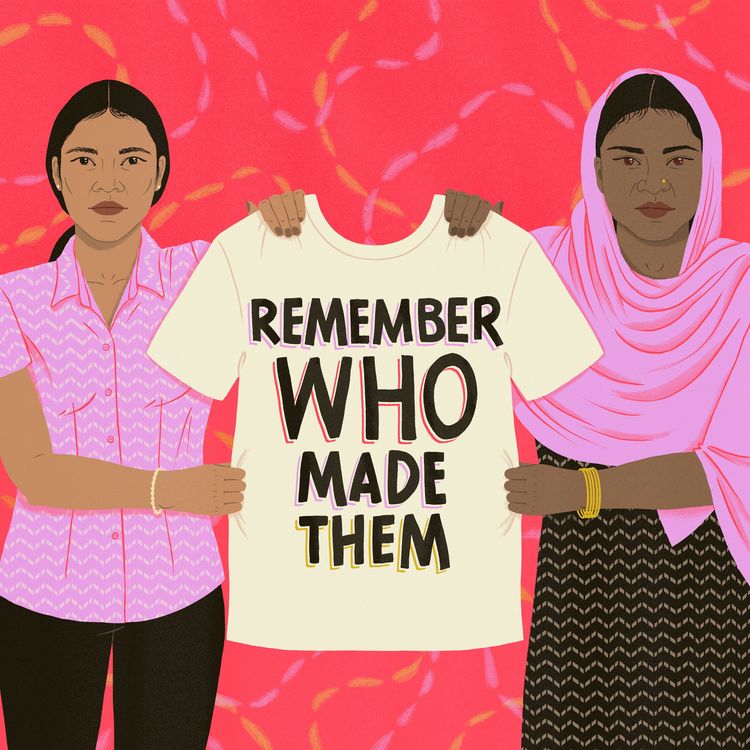
Remember Who Made Them
It Starts With Respect: Labour Organising (Part 2)
We all love clothes, let's Remember Who Made Them. In the previous episode we started hearing how workers were organising to demand better: better wages, better treatment, better conditions and above all dignity. In this episode we delve into how and why the fashion industry is so full of extraction and exploitation, from workers perishing at Rana Plaza, to sexual exploitation in Lesotho, slavery in Leicester and millions on the brink of starvation during the COVID pandemic. Is it just a mistake that so much is going wrong? We speak to Business and Human Rights who explain what union busting is, why it’s increased during COVID and why we should all be concerned. In this episode we hear from workers and organisers from Julia and organiser from El Comité Fronterizo de Obreras (Border Committee of Workers), located on the US - Mexico Border about the levels of violence they face when they organise to demand better. We speak to Tania from Fondo Semillas who is hopeful that labour organising and feminist organising and the representation of the women who make our clothes will bring the change and equity we are looking for.
Our guests:
Thulsi Narayanasamy from Business and Human Rights
Julia Quinoz from El Comité Fronterizo de Obreras (Border Committee of Workers)
Tania Turner from Fondo Semillas, Mexico
Find us on Patreon: RememberWhoMadeThem
Find us on Instagram: @RememberWhoMadeThem/
Get in touch: hello@rememberwhomadethem.com
Resources:
More on Business and Human Rights https://www.business-humanrights.org/en/
More on Fondo Semillas https://semillas.org.mx/en/
#WomenSewingChange campaign launched last year, as well as the video that ReMake made with Fondo Semillas' grantee partner MUSA Oaxaca in 2018.
#WomenSewingChange: https://bit.ly/2R75SbT
Podcast artwork by: Judith_P.Raynault
Music: Melisa Le Rue Life Is Beautiful produced by Colin Emmanuel
Disclaimer: This is a not for profit campaign. Everyone involved is giving their time free of charge. This podcast is not sponsored and features no adverts.
More episodes
View all episodes
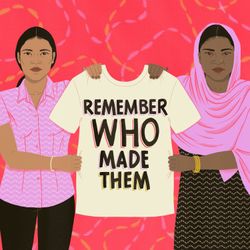
7. End Of Year Special! Consumer Activism Can Change The Fashion Industry
01:12:23||Season 1, Ep. 7In 2020, the Covid-19 pandemic and the lockdowns that followed exposed and exacerbated the exploitation and inequalities that have always been at the centre of the global fashion industry. In this end-of-the-year bonus episode from us at Remember Who Made Them, we discuss how we can inspire ethical consumers to become consumer activists. We talk with author and one of the initiators of #PayUp Fashion campaign: Elizabeth Cline and to labour organiser Andrew Tillet Saks about how brands hold the power and what more we can do to be in solidarity with workers. Venetia also talks to two Myanmar based workers, Tin Tin Wei: union president at Running-Tex Garment Factory and an organizer for the Federation of Garment Workers Myanmar and Thuzar Kyi, union president at Amber Stone factory. Myanmar hit the headlines earlier this year when several news outlets reported widespread violence and intimidation of workers which were also raised in the report by Business and Human Rights on emerging and widespread patterns of supplier factories appearing to target unionised workers, organising for better conditions who were being aggressively and illegally dismissed.Tin Tin and Thuzar’s stories are incredibly powerful and we hope listening to their commitment to work everyday for a more fair and just fashion industry will inspire you. We also give deep gratitude to Shin, who translated for Tin Tin and Thuzar so more of you could hear their powerful stories. Read: Elizabeth Cline for Atmos: https://atmos.earth/ethical-consumerism/Find Pay Up Fashion: https://payupfashion.com/Guardian Article on Garment Worker Dismissals in Myanmar: https://www.theguardian.com/global-development/2020/aug/07/covid-led-to-brutal-crackdown-on-garment-workers-rights-says-report Business and Human Rights Report on Union Busting: https://media.business-humanrights.org/media/documents/files/200805_Union_busting_unfair_dismissals_garment_workers_during_COVID19.pdf Find us on Patreon: RememberWhoMadeThemFind us on Instagram: @RememberWhoMadeThem/Get in touch: hello@rememberwhomadethem.com Podcast artwork by: Judith_P.Raynault: @judith_p.raynaultMusic: Melisa Le Rue Life Is Beautiful produced by Colin Emmanuel. Disclaimer: This is a not for profit campaign. Everyone involved is giving their time free of charge. This podcast is not sponsored and features no adverts.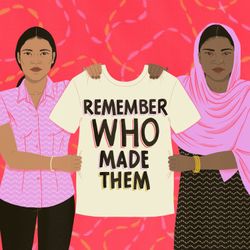
6. Season Finale: Capitalism Is A Virus
50:28||Season 1, Ep. 6We all love clothes, let's Remember Who Made Them. Across this season and the campaign, we have explored how the Covid-19 pandemic and the national lockdowns that followed have exposed the exploitation that has always been at the centre of the global fashion industry. Retailers have cancelled billions of dollars’ worth of apparel orders - including many that had already been completed. This has left millions of garment workers around the world without a source of income, or forced to put their lives at risk to feed themselves and their families. But it’s nothing new. Coronavirus didn’t change the apparel industry overnight, it has just exacerbated the inequalities and discrimination that have always been there. In this final episode Devi speaks to Nazma Akter, founder and Executive Director of Awaj Foundation in Bangladesh. Nazma has been working to improve the rights of women working in the garment sector in Bangladesh for over three decades after beginning to work in garment factories at the age of eleven. Venetia, Devi, Ruby and Swatee reflect on the learnings from the campaign and speaking to the many garment workers and organisers who have been fighting for decades against unfair wages, unsafe working conditions, violence and sexual harassment in the workplace and environmental destruction in their communities. We reflect on the system of Capitalism and exploitation, the many actions we can take on how we can be better allies to reimagine the future of fashion and what alternative models and Solidarity Economies look like. These alternative models are always inspired by principles of cooperation, equity in all dimensions (race, ethnicity, nationality, class, gender, ability, etc), participatory democracy, sustainability and pluralism. The new solidarity economy redistributes wealth and resources more fairly, and puts the respect of people and planet at its core. Our guest:Nazma Akter - Founder and Executive Director of Awaj Foundation, a grassroots labour rights NGO with over 600,000 worker members across Bangladesh.Find us on Patreon: RememberWhoMadeThemFind us on Instagram: @RememberWhoMadeThem/Get in touch: hello@rememberwhomadethem.com Podcast artwork by: Judith_P.Raynault: @judith_p.raynaultMusic: Melisa Le Rue Life Is Beautiful produced by Colin Emmanuel. Disclaimer: This is a not for profit campaign. Everyone involved is giving their time free of charge. This podcast is not sponsored and features no adverts.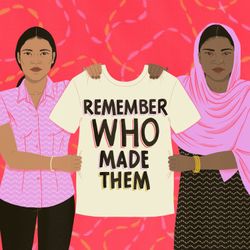
4. Actions Make Movements: Labour Organising (Part 1)
55:49||Season 1, Ep. 4We all love clothes, let's Remember Who Made Them. This is the first of a two-part episode where we delve into how garment workers are organising, what is organising and why is collective action important. So often, workers are only cast as victims - we want to make sure to tell the story of how they are leading the way to justice. We start with Swatee, who interviews Monika from the Solidarity Centre to understand what organising actually is, a few stories of what successful organising looks like and what a consumer’s role is. Then we hear a bit of the activist journey of Chamila, leader of the Dabindu Collective, a garment workers collective in Sri Lanka. From there, Devi speaks with Annanya, from the Asia Floor Wage Alliance, who explains the connections between the individual worker, to the union, to the regional alliance, to the global movement to transform the future of fashion. Stay tuned for Part 2 of how actions make movements, when we speak to more organisers and their allies from other countries. Our guests:Monika Hartsel from Solidarity Centre based in the United States Chamila Thushari from Dabindu Collective in Sri LankaAnannya Bhattacharjee from Asia Floor Wage Alliance and Garment and Allied Workers Union in North India Find us on Patreon: RememberWhoMadeThemFind us on Instagram: @RememberWhoMadeThem/Get in touch: hello@rememberwhomadethem.com Resources: More on Solidarity Centre: https://www.solidaritycenter.org/More information about Dabindu Collective which Chamila is an organizer for: https://bit.ly/2Yi2GxM During Chamila’s story, she talks about the EPZ - the Export Processing Zones. These are special areas in a country that provide special benefits, such as less restrictions, no taxes and no customs, for enterprises with them. They are designed as an incentive for foreign companies and to encourage overall economic trade. Chamila also refers to the CID, which is the Central Intelligence Directorate - the main intelligence and security agency in Sri Lanka.More on Asia Floor Wage Alliance: https://asia.floorwage.org/More on Anannya: https://www.opendemocracy.net/en/beyond-trafficking-and-slavery/portrait-of-indian-labour-activist/More from Annanya on North-South solidarity: https://www.opendemocracy.net/en/beyond-trafficking-and-slavery/regional-organising-and-struggle-to-set-asia-floor-wage/This documentary on Living Wages and what it means to fight for them: https://www.youtube.com/watch?time_continue=18&v=zsR87lFmE6Y&feature=emb_logoWith thanks to those that read the translations in English: Sakuthala Mapa (for Chamila) and to Global Fund for Women and Mama Cash who facilitated introductions to Solidarity Centre and Annanya Bhattacharjee. Podcast artwork by:...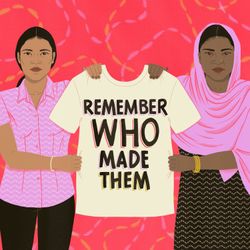
3. Feminist Fashion: Emancipation Or Exploitation?
50:52||Season 1, Ep. 3We all love clothes, let's Remember Who Made Them. In episode 3 we discuss Feminist Fashion. As brands and retailers claim to be “empowering’, ‘feminist” or “committed to equality” how do the 80% female workforce in the fashion industry fare? What happens when the patriarchal system manifests in the industry? Devi speaks with Jeeva, a garment worker and member of the Dabindu Collective in Sri Lanka about the conditions of her work, the impact of the COVID crisis and the changes to the workplace as targets and production continue to increase at alarming rates. Swatee speaks to Saira and Koussar, members of the Home Based Women Workers Federation in Pakistan, about the invisibility of their work, balancing care and work responsibilities and being the breadwinners for their families, busting the myth that women only need economic empowerment to have equality. Devi summarises the intersectionalities, with former Human Rights Commissioner for Sri Lanka, Ambika. Around the world, we still value men’s work above women’s work - and this is where gender inequality is especially clear. When we ascribe a different value to a person because of their gender, that is the social and cultural traits associated with their biological sex. Is Feminist Fashion really about emancipation or just continuing patterns of exploitation? Our guests:Jeeva based in Katunayake, Sri LankaKoussar Ali based in Sanghar, Sindh, Pakistan Saira Feroz based in Karachi, Pakistan Ambika Satkunanathan based in Colombo, Sri Lanka Find us on Patreon: RememberWhoMadeThemFind us on Instagram: @RememberWhoMadeThem/Get in touch: hello@rememberwhomadethem.com Resources: Talking Tastebuds: Fashion is a Feminist Issue: Venetia La Manna and Swatee Deepak: https://play.acast.com/s/talkingtastebuds/swateedeepak-isfashionafeministissue-Article from WWD on Highest-Paid Executives in Fashion: https://bit.ly/3iYxagpIllustration on what makes up the price of a Zara hoody: https://bit.ly/3gbjgWxLearn more about how to calculate a Living Wage in Asia: https://bit.ly/3l49MA3And in the UK: https://bit.ly/31d3aalMore information about Dabindu Collective which Jeeva is a member of: https://bit.ly/2Yi2GxM A book on Juki Girls: https://bit.ly/2Yj3v9YMore information about Home Based Women Workers’ federation in Pakistan which Saira and Koussar are members of: https://bit.ly/3gmIy49 The union organises home-based workers, primarily in the garment sector and bangles industry in Sindh, and was involved in the international campaign against Kik, a retailer in Germany that was sourcing from the Ali Enterprises factory in Karachi, that burnt down in 2012 and killed over 200 workers.More on MamaCash: https://www.mamacash.org/en/why-women-power-fashionWomen in Informal Employment: Globalising and Organising (WIEGO):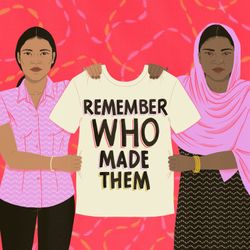
2. Fashion Has A Racism Problem with Aja Barber & Salamishah Tillet
44:53||Season 1, Ep. 2We all love clothes, let's Remember Who Made Them. In episode 2 of this podcast, Swatee discusses fashion and racism with Aja Barber and Salamishah Tillet. Devi reads a poem by Wu Xia, a Chinese garment worker - demonstrating the connectedness of our fashion industry from the person who makes our clothes to the person who buys and wears them.Find our guestsAja Barber: @ajabarber/Salamishah Tillet: @salamishahFind us on Patreon: RememberwhomadethemFind us on Instagram: @rememberwhomadethem/Get in touch: hello@rememberwhomadethem.comResources Aja Barber’s post on brand accountability: https://bit.ly/30JQrMeSalamishah for the New York Times on fashion and racism: https://nyti.ms/33K3cIDHow to Fix the Fashion Industry’s Racism by Minh-Ha T. Pham: https://bit.ly/3fM0UepMore on the group in Guatemala references, AFEDES: https://bit.ly/30JrY9Lhttps://bit.ly/30GwA0p North American Free Trade Agreement: https://bit.ly/2PIEGPGWorld Trade Organisation: wto.orgPodcast artwork by: @judith_p.raynaultMusic: Melisa Le Rue Life Is Beautiful produced by Colin EmmanuelDisclaimer: This is a non-profit campaign. Everyone involved is giving their time free of charge. This podcast is not sponsored and features no adverts.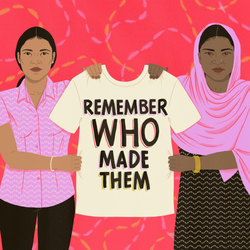
1. Solidarity Is Not A T-Shirt: Coronavirus, Loststock and #PayUp with Ayesha Barenblat
49:52||Season 1, Ep. 1We all love clothes, let's remember who made them. In this podcast Venetia, Swatee, Devi and Ruby introduce their fashion solidarity campaign born out of the global pandemic's impact on garment workers and the fashion industry. We discuss charity t-shirts, Forever 21's Pride Campaign, Loststock and Venetia chats to Ayesha Barenblat, founder of Remake to learn about their incredible #PayUp movement.Find us on Patreon: https://www.patreon.com/RememberwhomadethemFind us on Instagram: https://www.instagram.com/rememberwhomadethem/Get in touch: hello@rememberwhomadethem.comMentions:Fashion Is A Feminist Issue podcast: https://apple.co/2OIUyBkPull Up For Change: https://www.instagram.com/pullupforchange/Minh-Ha T. Pham’s article: https://bit.ly/39dzsV7Tansy Hoskins’ post: https://www.instagram.com/p/CBdd83Kg9dK/Princess Nokia x Forever 21: https://www.instagram.com/tv/CBV6HQ2gbP2/Re-Make: @remakeourworld/Sign the #PayUp petition: https://bit.ly/2CvIlNRFollow the #PayUp tracker: https://remake.world/stories/news/payup-brand-updates/Watch this extended interview with Venetia and Ayesha: https://bit.ly/3jkRVnxArtwork designed by Judith P. Raynault: @judith_p.raynault/Music: Melisa Le Rue 'Life Is Beautiful' (produced by Colin Emmanuel): https://spoti.fi/302rmfbDisclaimer: This is a non-profit campaign. Everyone involved is giving their time free of charge. This podcast is not sponsored and features no adverts.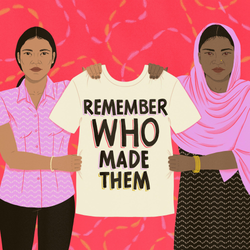
1. Series Trailer: What To Expect From This Brand New Fashion Podcast
01:32||Season 1, Ep. 1Welcome to Remember Who Made Them, a brand new six part podcast series, digital campaign and fundraiser that aims to help energise a new solidarity economy in fashion.Find us on Patreon: https://www.patreon.com/RememberwhomadethemFind us on Instagram: https://www.instagram.com/rememberwhomadethem/Get in touch: hello@rememberwhomadethem.comMusic: Melisa Le Rue 'Life Is Beautiful' (produced by Colin Emmanuel): https://spoti.fi/302rmfbArtwork by Judith P Raynault: @judith_p.raynault/Disclaimer: This is a non-profit campaign. Everyone involved is giving their time free of charge. This podcast is not sponsored and features no adverts.